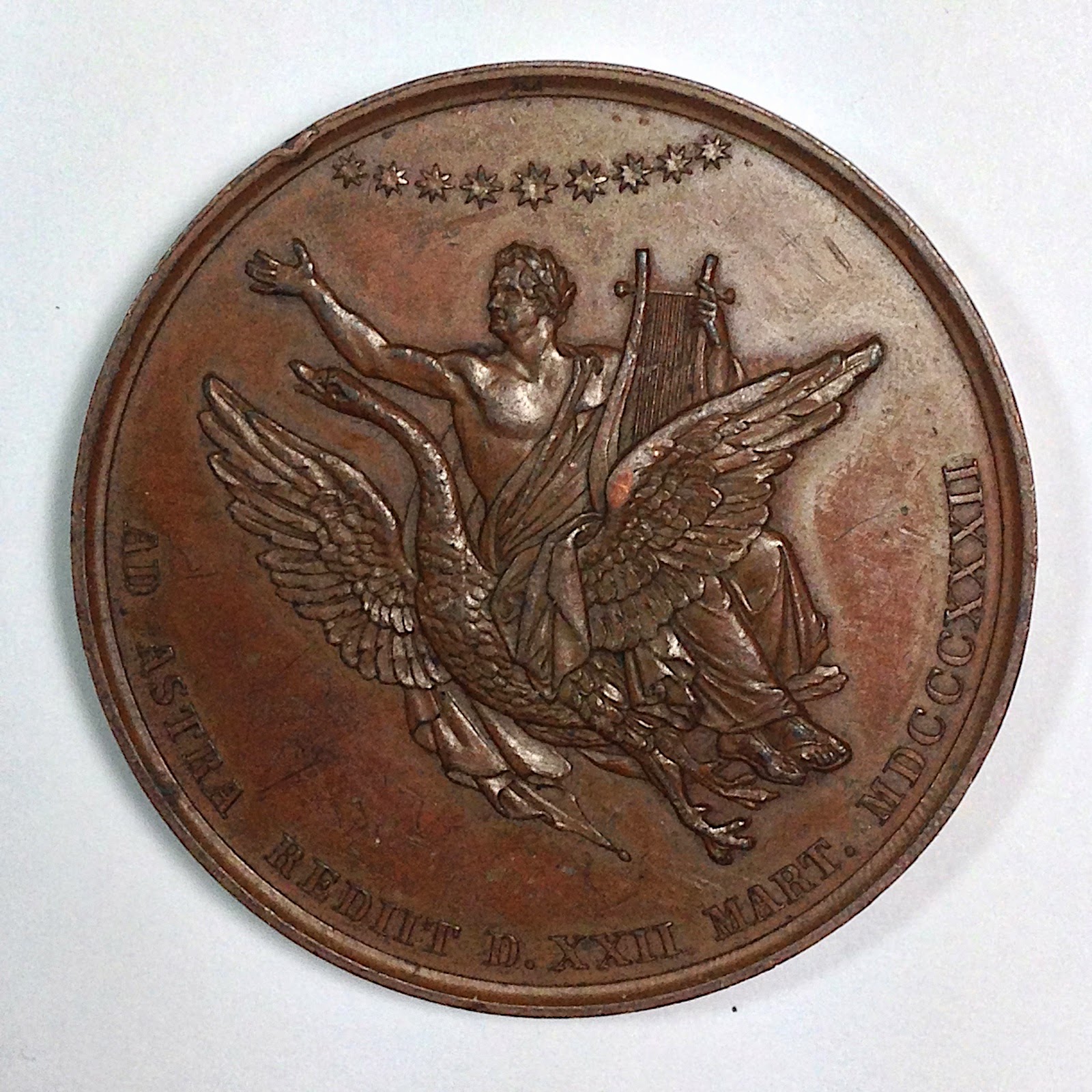March 22 is the death anniversary of Johann Wolfgang von Goethe, generally regarded as the greatest German author: culturally, for Germans, the equivalent of Shakespeare for the English or Dante for the Italians.
Goethe lived much later (1749-1832) and thus did not play quite the comparable role in the formative development of the vernacular (that role fell to Luther, though it was only in the 18th century that German, in the words of Eric Blackall's pioneering study, truly emerged as a "literary" language), but his influence was immense and his erudition far more wide-ranging. His work ranged from poetry, drama, and the novel to art criticism and prescient scientific speculation on paleontology, geology, and evolution. Along with his collaborator and best friend Friedrich Schiller, he came to embody "Classical" German literature and aesthetics that set the ideal for the middle classes well into the twentieth century.
Although Goethe came to surpass Schiller in reputation (as well as outlive him by a generation), it was Schiller who became the true cult figure and idol of the educated bourgeoisie as well as large elements of the lower and working class.
When the American numismatist Horatio Storer of Newport attempted an inventory of commemorative pieces in the 1880s, he found "that the medals of Goethe are intrinsically, and as compared with others of a similar character, those of Schiller, for instance, extraordinarily rare." Undertaking such a survey at that time, without benefit of easy international communication and shipment (much less, the internet), and basing his conclusions on the (not always reliable) reports and reproductions of others was a daunting task, but his generalization stands. Another difference, though he did not note it, is that all Schiller medals are posthumous.
This is one of the rare medals that he listed, issued on the occasion of Goethe's death. Storer was interested in medals involving figures who had some ties to medicine and science, and he notes that this one was "in the Lee collection, at the U. S. Surgeon-General's Office in Washington." The image below is from my own copy.
Engraver: Anton Friedrich König (1794-1844)
Produced by the famous Loos mint: in this period run by Gottfried Bernhard Loos (1773-1843) in Berlin.
Bronze. Diameter: c. 42 mm. (It was also issued in a silver version).
Obverse
Portrait bust of Goethe in late life, crowned with laurel, facing left.
Motto: IO. W. DE GOETHE NAT. D. XXVIII AUG. MDCCXXXXIX
[i.e. JO[hann]. W[OLFAGANG] VON GOETHE, BORN 28 AUGUST 1749]
Inscription in the shoulder: F. KÖNIG F.
Beneath that: G. LOOS DIR.
Reverse
In Storer's description:
"A swan raising Goethe, laureated and in antique garb, with his lyre, to the skies, which are typified by an arch of nine stars. His breast is partially bare, his right hand upraised, and he looks upward, seated upon the back of the swan."
The aesthetic may not be entirely our own, but Storer notes that "Rollet considers the reverse to have been 'nobly conceived and executed.'"
Motto: AD ASTRA REDIIT D. XXII MART. MDCCCXXXII
[i.e. he attained the stars 22 March 1832]
It was not unusual that an announcement of the medal appeared in The London Literary Gazette no. 817 of 15 September 1832:
It is perhaps more significant that the same basic text appeared here in our region of the northeastern American hinterlands, in The Rochester Gem: A Semi-Monthly Literary and Miscellaneous Journal..., 5 no. 4 (9 Feb. 1833):
One of my research projects is to begin to trace these patterns of communication involving numismatic commemoration of literary figures. Already I can see that the paths do not always run in straight, direct lines, and that our instinctive assumptions may be wrong. For example, the above two examples, from two different continents, separated by some five months, are virtually identical, apart from the spelling of the poet's name (a not uncommon issue in German as well as in English for some time) and punctuation. By contrast, earlier pieces published in New York City were clearly not the model for the Rochester notice.
Should any further proof be needed for the emergence of what Goethe called "world literature"--that is, a universal possession of all humankind, transcending national boundaries and appeal--of which he himself had now become a part? I think his shade would have smiled at the notice in the provincial New York paper.
Great News From GDELT Project: “A Transformative New Chapter: Translating
The Entire Quarter-Century TV News Archive Through Gemini For Just $54K +
All Channels Now Translated”
-
From a GDELT Project Post: Today we are announcing a transformative new
chapter in planetary-scale translation and towards our vision of making it
possible...
2 days ago













No comments:
Post a Comment